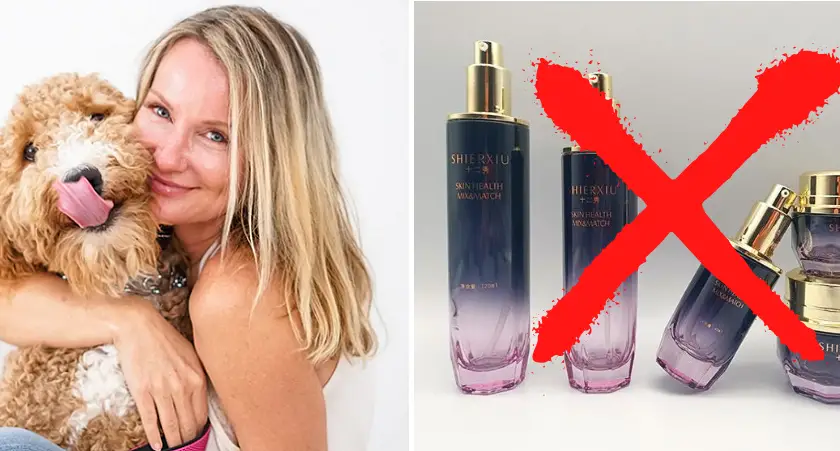American consumers spend nearly $50 billion on cosmetics each year, a $49.2 estimate by Zippia.com, a career research website, and the market shows no signs of slowing.
Unfortunately for those who purchase them, many of these products are filled with potentially harmful chemicals.
According to the Environmental Working Group’s ‘Shopper’s Guide to Safe Cosmetics,’ cosmetics companies can use “almost any chemical they want.”
The good news is that the industry is rapidly changing, led by pioneering companies like OZNaturals who take natural beauty seriously and strive to create products that are free from toxic ingredients.
Recently, OZNaturals founder Angie Irish, a licensed esthetician, shared her list of nine chemicals you should never, ever put on your skin.

These are the nine most important chemicals to avoid while checking cosmetic labels, in Angie’s personal opinion:
1. Parabens-
Parabens are a class of cosmetics that are often used as preservatives. According to the Environmental Working Group, parabens disrupt hormones and harm the reproductive system.
2. Sulfates-
This class of chemicals may have irritating and drying effects on the skin, especially sodium laureth sulfate (SLES).
Sodium laureth sulfate is often found in natural products, but that doesn’t mean it’s healthy for your skin.
According to the International Nomenclature Cosmetic Ingredient (INCI) cosmetics ingredient app, sodium laureth sulfate, a commonly used type, has been criticized for its irritating and drying effect on the skin. It has also been criticized as being a pollutant for the environment, animals, aquatic environments and plants, yet it is still found in cosmetics products often.
The term INCI is used to describe a standardized set of names that are internationally recognized to identify cosmetic ingredients. More information can be found on the website Personalcarecouncil.org.
3. Petrochemicals-
Petrochemicals derived from petroleum are strongly regulated in the European Union, which forces companies to reveal the source of these ingredients and to prove that they are not carcinogenic.
Meanwhile, North American consumers are kept in the dark.
Some of the main petrochemicals to avoid or at least be suspicious of include:
-Paraffin wax
-Toluene
-Benzene
-PEG or polyethylene glycol
-DEA or diethanolamine
-MEA or ethanolamine
-Butanol or any word that starts with butyl
-Mineral oil, especially if no further information is given
4. Formaldehyde-
Formaldehyde is a carcinogenic compound that is often used as a preservative in cosmetic products. Some ingredients to recognize and avoid include Imidazolidinyl Urea, Diazolidinyl Urea, and DMDM Hydantoin.
Others include paraformaldehyde, methylene glycol, and Quaternium 15, which releases formaldehyde according to the Environmental Working Group.
5. Phthalates-
Oftentimes, these hormone and reproductive system chemicals don’t even need to be listed on the package. But two to watch out for are dibutyl and diethylhexyl phthalates according to the EWG.
6. Benzoyl Alcohol-
The potential negative side effects of this ingredient are “considerable” according to a 2016 study published by Science Direct.
It is generally used as a solvent in the production of paints, perfumes and adhesives, but side effects may include skin irritation, while inhaling may induce “vomiting, headache, diarrhea and/or collapse” according to the study.
7. Phenoxyethanol-
Used as a preservative in cosmetics and a stabilizer in perfumes and soaps, phenoxyethanol has been linked to side effects ranging from eczema to life-threatening allergic reactions according to SafeCosmetics.org.
8. Artificial Fragrance-
If you see the word “fragrance” on a product package and aren’t sure of its origins, you should be cautious and strongly consider putting it back on the shelf.
Several chemicals, including at least two potentially harmful types of phthalates, may be disclosed on the label as “fragrance” but do not have to be disclosed as individual chemicals according to the EWG.
9. Synthetic Colors-
The FDA has little authority to review chemicals in personal care and cosmetics products, yet they still often find cosmetics that contain banned color chemicals.
If a specific color is listed on the product package and it’s not from a natural source, don’t buy it.
Try Oz Naturals Instead — Free From All of These Ingredients

The company OzNaturals was founded by Angela Irish, a licensed aesthetician and holistic researcher.
Before starting the company, Angela became frustrated with the lack of healthy cosmetic product choices. Most were not up to her standards of efficacy, ethical ingredients, quality and affordability.
The brand was started in 2013, and according to Angela OzNaturals will never waiver on delivering the best and cleanest products to the customer.
OzNaturals offers a wide range of vegan products and is Leaping Bunny Certified, meaning that no new animal tests were used in product development.
Some of their most noteworthy products include their Dragon’s Blood Facial Serum, which contains the rainforest super-herb Sangre de Grado, rosehip oil and more, as well as exfoliators, body butters and more.
The company’s Vitamin C serum increases collagen production and promotes glowing, healthy skin.
Its body butter helps to remove stretch marks and contains avocado oil, shea butter and more.
Its natural exfoliator gently cleanses skin and unclogs pores.
For more information on Angie’s company and promise to her customers, visit the OzNaturals website by clicking here.





